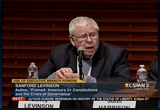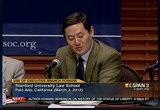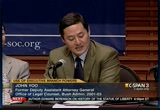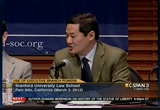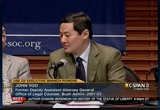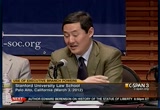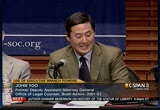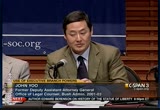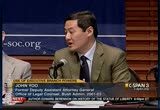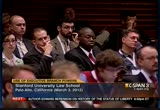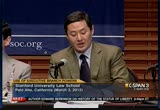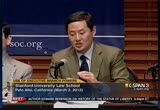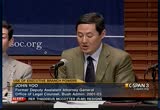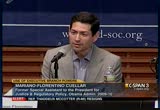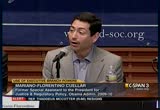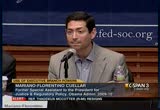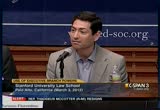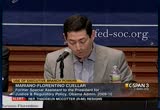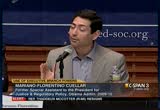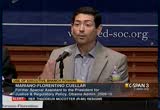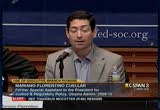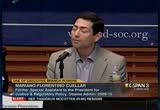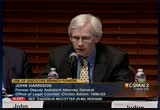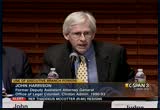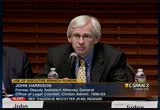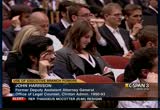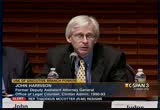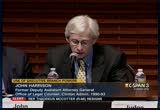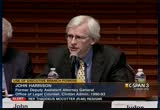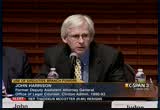tv [untitled] July 6, 2012 5:30pm-6:00pm EDT
5:30 pm
likely the students and the professors are likely to know where it's impossible not to know the experience of the state constitution. it's extraordinarily important to integrate the laboratories of experimentation and to see how different a lot of the states are, including i suspect the administrative law and whether there might be something to learn from that. rather than to repeat what are basically now rote arguments about how best to interpret i think the divisionuous terms of the united states constitution. >> thank you. professor? >> i would like to thank the federal society for giving me the chance of leaving the city and come to a conservative place like stanford university. i am glad the organizers were
5:31 pm
able to arrange. i don't think they are real protesters outside. they know me too well. they know i love the imperial side in all of the "star wars" movies. i think it's unfair when the jedi knights try to fix everything. they are like federal judges. they fit into the constitutional system. they have clerks following them around and doing the bidding and they intervene. it's very interesting. someone will write a student note about this. if you are getting protested, you are the good guys. next time i will get protested by someone in a curious george outfit whoa will accuse me of working with the man in the yellow hat. it's really a pleasure to be here, but i am glad to be on a
5:32 pm
panel and one of the few panels that does not have richard epstein on it. she not allowed to speak. he will rectify the imbalance i'm sure. >> one personal story that they do every two weeks. one happens to be in new york and in carnegie deli where they proceeded to instruct the waitress what all the sandwiches should have in them. it was lovely. i very much enjoyed them and sympathize quite a bit with them
5:33 pm
and i agree the scholarship in our field is moving in our direction where we moved with constitutional design with historical legit masy and authenticity and we had to take what he had to say a little bit further. i am not convinced that even if we design a modern presidency knowing what we know now, we would design something that different from what the original presidency was supposed to be. a lot of the problems we had with the performance to say today has to do with a lot of tuts and purposes that we have seen them have which were not looked to framers in 1789. we are having a difficulty reconciling what he left as president and they have various deficiencies and attacks and duties that we expect of them. that goes beyond the constitutional design. the other thing i mentioned when i looked at it, it was fascinating.
5:34 pm
i am going to buy his book at lunchtime. that doesn't mean you shouldn't buy mine too. the presidents he is talking about, the good and bad, i have been interested in the kind of qualities he wanted. and cabe ham lincoln would not have been one that you elect into office. he was a loser. he won one term to the house and became famous by losing a senate race. he was everybody's second choice and could have predicted that he was being good and didn't have expertise. you wanted to leave george mclellan as president. he lost. on the flip side, i was thinking what president in our time might have been most on paper was most prepared for the domestic side and surrounded him with the smartest people?
5:35 pm
the person i came up with was richard nixon. great foreign policy president and think who we had working for him. george shuttle and he had very innovative inside. that brings me to the point i was going to make in broader scope. part of the reason we had this problem is because we had the framers design for the presidency is quite different. today we tend to focus on the american presidency for the -- equal parts for the domestic program where they had a much narrower view for the presidency. i think the framers expected the executive branch to be devoted to foreign affairs. here i think we have seen in the last ten years the presidents despite george w. bush's presidency trying to actually
5:36 pm
almost by themselves in foreign policy. domestic affairs, if you read the papers, there is not a lot of discussion about the role of the president in domestic affairs. you would be surprised to see the kind of president we had today in this area. they thought the president would be a check on congress and not somebody urging and pushing congress to enact the president's program. alexander hamilton said the executive is necessary to protect against the irregular and high-handed combinations that interrupt the ordinary coarse of justice. i love this phrase. the humors of the legislature. i guess this is why they elected that.
5:37 pm
you lock at the discussion of the veto power and the federalist papers, it's not talked about as this sword by the president to convince the congress to enact his or her program. it is discussed as the president to protect its own constitutional authorities and to furnish an additional security about the enaction of improper laws and laws that would be unfriendly to the public good. we have president who is feel it is their role to enact domestic policy and integrate their policies to the legislature and this is something that runs against the framers and some levels that president obama has been having in public opinion polls.
5:38 pm
and even much of those laws might be in congress. they talked about getting obama care passed and love the names like gatorade for florida and the corn husker field in nebraska. all those deals we attribute to obama. the president came too close to congress and too associated with the activity in passing legislation rather than to check congress. the president's opinion polls and opinions to start the track and very low opinion we have of members of congress. the framers did expect the executive branch to come to the floor. it's the only reason you figure out why you need to have an independent executive from the legislature. we could have a parliamentary system of government. they appoint the cabinet members
5:39 pm
who are going to execute their policies. if foreign policy, you thought they ought to have something different because foreign policy has unique differences from domestic policy. they are unpredictable and difficult for the legislature to pass laws in anticipation of what's going to happen with foreign affairs. there is more advantage to have in person with what the framers call decision,y y isecrecy and might be able to accept more errors by a single person in exchange for being faster and more quickly. alexander hamilton said war is the greatest challenge and that area of human that is best suited to control by the executive. administration by the executive. i think that the basic trade off between and this responds with regard to the point, you can have a government by legislature
5:40 pm
which we have seen in a lot of parliamentary systems of government. they trade off and it's hard for legislatures to enact quickly. they make less mistakes and the more who participate, the less likely they make an error. foreign affairs and our constitution creates more checks that tries to make it harder for policy to get past. there is no great harm from slowness. there is always the states that can regulate. there is not like there is a vacuum or federal action. foreign affairs however, there is that kind of cost from enaction. there is advantage for acting faster. one minute left, i will bring it back to the actual topic of the panels which is czars in libya. i agree with czars that are constitutionally problematic,
5:41 pm
but administration is aed about idea, but presidents took it on to get so involved with legislature and the laws they need. more and more people to assist them. i don't think it raises a great constitutional difficulty, but libya i think is a demonstration about presidents actually having to reduce the kind of vigorous constitutional presidency that should operate in national security in foreign affairs. for example, what struck me was the claim that libya was not a war. that would have surprised mr. gadhafi. since we were trying to kill him and we delayed our intervention to get the united nations's approval where the current administration thought it was more important to get the approval than from congress. that i thought was a remarkable thing. the presidency trying to actually limit its own freedom
5:42 pm
of action by tying the fate of our national policy to an organization that is not part of our political system. thanks very much. >> thank you very much. i salute barbara michael and dave and your friends for organizing the conference. i am delighted to see you. i want to congratulate you for being in the audience. for those of you who are passionate, i couldn't imagine doing anything different. my kids spent most of their mornings thinking about these great things. that has turned into a dangerous thing. i will give you an example.
5:43 pm
my 7-year-old daughter said to me i think there is a problem with one of your doctorates. you didn't say how much trash i should take or where i should take it. i might have to change my strategy. i want to take just a few minutes to make basically two points. one point is to situate this discussion in a bit of historical context. the other is to observe how history is evolving. i hope in the process, not so much to directly answer the questions that we should all address. we put the scheduling on the context of how to think about these things. i want to start about the reagan administration because it's hard to think about a great deal of national level discussion about the role of the presidency in foreign affairs and domestic affairs. i commit that the reagan administration stood for the proposition that a vigorous
5:44 pm
executive can play a in the country in domestic and international affairs. on the domestic affairs particularly given john's comments, many of the leading cases that we talk about in the block that you probably discussed if you take a block are about the reagan administration and state farm. these are cases where the white house is trying to reflect a particular philosophy or approach to how the law should be implemented and not everybody in the country agrees with and as justice rehnquist said in state farm reflects a degree of democratic legit masy and an interest they have in implementing the laws in a different way. how he asked could we not expect elections to matter. we expect it to flow from the president and that is not
5:45 pm
something that goes back to the reagan administration and it goes forward that was alluded to yesterday. it goes backward i want to read from some do you wants and briefly quote testimony from the truman administration and what was a foot in the reagan administration. all of us here had with congress and the court packing. you may not have followed closely that a parallel battle just as intense at the time probably comparable to the debates today. reflected the roosevelt administration's interest in reorganizing. roosevelt was clawing for authority to reorganize the branch. when congress slapped that down as it did the court packing plan, interestingly enough, the
5:46 pm
roosevelt administration did not take another run. if you want to hear more about what happened, you can read a book that is about to be published and is not on sale today. in the roosevelt library, describe what they were saying about the importance of organization. i will let them speak for themselves. first, do those things that may reduce the multifairuous duties and dismiss him in do those things that will do the work of administrator who is have been chosen. whose responsibility to the people is through the president.
5:47 pm
the heads of departments and their own responsibilities. the memo goes on and has a note at the bottom that said historical note. this is what i found interesting. the aides are describing the result of an effort that was undertaken by a commission to see how the government should be reorganized and this is what the staff said. it is an interesting fact that few federal administrators have spoken to the members on administrative management in terms of the interest of the president or the presidency or the administration and nearly always in terms of the immediate and particular interest of the department or bureau as if it were a tragedy. a couple of things to observe. number one is the extend to which roosevelt's understands. we can argue about whether it's right or wrong, but when they put a spot, they are not doing
5:48 pm
so. the staff is concerned about how even hand picked, very loyal lieutenants in agencies might actually have a divergent view. here's one of trueman's agency officials testifying before congress describing how he views his role as a presidential appointee. the department head must be regarded as an extension of the president's permanent. he is expected to carry out basic instructions which a president may provide for his guidance. attitude that is described as an important to bear in mind and they have brought public issues and about the scope and magnitude of activities and the ends and means of government action. my point here is that the trueman administration reflects agency officials describing to congress their understanding of the role of the agency heads as folks who have a technical role,
5:49 pm
but also a role of engaging in political judgment. this is what i want to krve in closing up. clearly you are talking here about a long running effort on the part of presidents from both parties. a large government and some largely created, almost entirely created by congress himself. that is culminated to have the executive office of the president to create senior aides and the roosevelt administration. nixon administration and kissinger administration and roger porter and george w. bush administration. i also want to note that this discussion was not happening with the judicial backing. you look at the case from 1915 and curtis wright and
5:50 pm
youngstown, these cases are almost household names and they reflect the judicial recognition of the special role both domestic and international affairs. i will end by noting the passage of time matters and to the extend that presidential powers are changing in competition among different congressional committees to enlarge them in an executive branch that involves agencies with overhappening jurisdictions. they often place the president in a strong role where the role of the president is to deconflict and coordinate different agencies. submit that courts also face great constraints, some of these
5:51 pm
constraints are from standing constraints. should be in recognizing that the courts have an important role but further recognizing that the rule of law is in our own hands, and by that i mean in the hands of people who are appointed to executive agency who is always have a chance to say, this is not what i signed up for, this is not what it means to be loyal to the corporation so i'm leaving this job. thank you very much. [ applause ] >> thank you, professor. >> my presence here is an example of what you might call just in time logistics, as a result of some travel difficulties they don't want to tell you about, i arrived about 15 minutes before the panel was scheduled to start so i am here. and in the interest of last-minute adjustments and spontaneity, i'm going to substantially depart from what i
5:52 pm
was originally planning to say which was largely about war powers and a little bit about czars and instead talk more broadly about the topic we have been discussing and pick up some of the things that everybody else on the panel has already said. the first thing i want to talk about is the centrality of the president, picks up something that the way that the truman administration after the roosevelt administration -- one of the things that the truman administration gave us is an almost certainly and potential disaster usually presidential constitution. on which i suppose john, you and i would have strong feelings because the story is president
5:53 pm
truman overruled the legal council. the result is a disaster for the constitution. >> from the president to the speaker of the house. then the president for pro tem of the senate, then through the cabinet. for a long period were the most recent changes which were done under the truman administration between 1945 to 1946, when the statute was reconsidered and revised in light essentially of modern warfare and in particular nuclear weapons. for the proceeding years the congressional officers had been taken out and the extension went almost entirely through the cabinet. which was a very good idea, both for policy reasons because it made it impossible to change the party controlled presidency by killing the president, which now can't be done again, if the congressional officers are in the line of succession.
5:54 pm
and better yet, and perhaps more importantly, it is at best highly doubtful whether it's permissible under the constitution for the congressional officers to be in the line of succession for the presidency. they are certainly not officer r officers. so imagine that something very, very bad happens to the president and vice president. the secretary of state being the president's party, the speaker let's assume being of the opposite party and they are bitterly divided on some major policy question. and -- i don't even like to think about what might happen under those circumstances and it is harry truman's fault.
5:55 pm
and the point i want to make her ises, president truman happened to believe very strongly that it was very bad for someone who had never been elected to act as president. so when the statute was revised right after world war ii, he was adamant, even to the point of over -- he was adamant that somebody who had been elected ought to be in the line of succession, and despite the constitutional difficulties with the arrangement and despite the problem of changing party, president truman said, well, i'm the president and that's what we're going to do. and one reason we have that, and so much particular power in the president of the united states is of course we have a quite short, a quite spare constitution and one that is very, very hard to change. and put all of those things together and you have a great deal of authority invested in the president.
5:56 pm
i think the single most important change that may well be made, will be the constitutional creation of a federal central bank. as a consequence, the constitution is too hard to amend, think of state constitutions and they are much easier to amend and they adapt to the times much better. we still have the original constitution. quite short, quite brief, as, john, you said, designed for a presidency that does not necessarily fit with the modern presidential role and in particular the role of the president as domestic leader. i will say that the idea of the president as legislative leader began almost at the beginning. this is one of those topics where the plan went awry almost from the outset and jefferson
5:57 pm
was the leader of a political party and was immensely influential. having to -- for being so brief and being so brief in particular about executive power and hence putting all sorts of important decisions like the one about presidential succession, specifically in the hands of the president. i would say that if you wanted to justify the system we have, and wanted to say, what is the role of the president, and we're thinking about should the president be making detailed decisions about how to structure the bailout? should the president be deciding monetary policy? quite possibly no. but one powerful argument that can be made in favor of the quite brief and spare system we
5:58 pm
have that puts so much stress on the identity of the president is that it creates a role for the president that maybe somebody can do. and one of the things i think specialists separations of powers and specialists in executive powers tend to underrate the insight on which chief justice taft's opinion on the united states is built. the part of the problem is that the opinion is, i don't want to make too much fun of chief justice taft. we'll just leave it at that. the fundamental insight is that if the president has the power to appoint and the power to remove, chief justice taft and the then president of the united states thought those two powers together were all the president needed and he might have been right. because if the president can decide in whom he has confidence. if the president can decides often in very technical areas, for example monetary policy, this is the sort of tendency that caused me to be elected should have in this role. and if the president can then take somebody out when he loses
5:59 pm
confidence in that person, even if he doesn't understand what has gone wrong. he know that something has gone wrong, all the people really need to act when they elect the president is not do you know anything about monetary policy, do you know anything about emergency management, do you know anything about nuclear disarmament. but one, what is your basic world view and are you the kind of person who can decide which expert to trust. can decide in whom all this confidence should be placed? you have this real skill of assessing the skill of other people. i don't want to be pollyanna on this.
174 Views
IN COLLECTIONS
CSPAN3 Television Archive
Television Archive  Television Archive News Search Service
Television Archive News Search Service 
Uploaded by TV Archive on

 Live Music Archive
Live Music Archive Librivox Free Audio
Librivox Free Audio Metropolitan Museum
Metropolitan Museum Cleveland Museum of Art
Cleveland Museum of Art Internet Arcade
Internet Arcade Console Living Room
Console Living Room Books to Borrow
Books to Borrow Open Library
Open Library TV News
TV News Understanding 9/11
Understanding 9/11